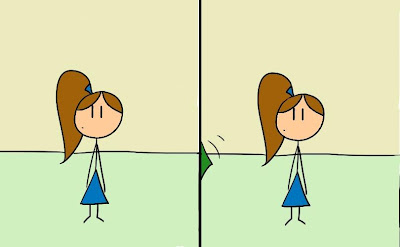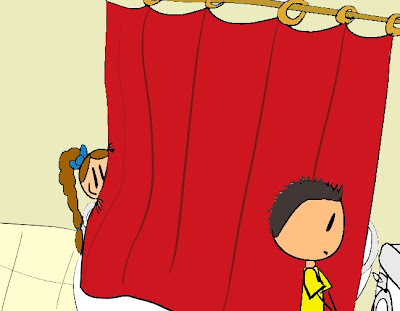I have the hardest time writing research papers.
Yeah I know, everyone has the hardest time with that. But I can only begin to write them when they are literally due the next morning as soon as I wake up. Otherwise I will never write them. I've tried making outlines beforehand, I've tried highlighting and dog-earing and all that other crap, but nothing works. I just have to sit down and just do it. It's work under pressure or don't work at all, and I usually prefer the not at all part.
However.
I recently rediscovered this...let's call it "research method" that I had written a couple years ago for my European History class (called Core II). It was every M-W-F at 8am. What was I thinking?
We had to write three six-page papers throughout the semester, each comparing and contrasting ideals between different books and essays from dead guys I could care less about.
And I never read any of them.
I got away with Sparknotes and skimming through used highlighted copies of the books I got from the bookstore. But even that was not enough to get me to write that first paper.
I sat at my computer, staring at the blank Microsoft Word document, contemplating how in the world I was going to fill six pages (with parenthetical citations) of constitutional monarchies and oligarchies and other archies I didn't understand. Finally I decided that I was just going to start typing and see how it all panned out.
The result is the following:
________________________________________________________________
P-- Hello and welcome to my freakin’ awesome core two paper. Here with me today are Misters Edmund Burke and John Stuart Mill. Say hi, fellas.
J-- Why hello there, young lady.
E-- Yes, bonjour.
P--They are going to help me with my paper about their books! No offense, guys, but they were both pretty grueling to get through.
J--Oh, no offense taken, Miss Ganzelli! Our essays were never actually intended to be analyzed for mundane school assignments.
P-- Really?
E-- Oh, indubitably! We wrote them just to be annoying and boring!
P-- Well, it sure worked, Ed. It sure worked.
E-- Why, thank you!
P-- Anyway, how should we start this thing? There are so many aspects of your essays I have no idea where to begin!
J-- Well, the prompt is to write how we view restrictions on liberty and revolution, correct? So we should just categorize the points: Start with what we actually think liberty is and the differences between civil and social liberty (and social contracts). Then move to the importance of this liberty, but include how it should be regulated so as to avoid things like tyranny of the majority and prevailing opinion. Be sure to include things such as religious tolerance, although Mr. Burke here believes in an established church, the weirdo.
E-- Hey! I have my reasons! And you shall hear about them soon enough when she actually starts writing this paper! Besides, you’re anti-Catholic anyway and Patty here is a Catholic!
J-- Oh… Well this is awkward…
P-- ANYWAY!
JE-- Sorry, Miss Ganzelli.
J-- Now, remember to include that we don’t want complete silencing of opinions because this would create chaos and would indeed lead to revolution. Then, with that, you segway into our thoughts on revolution and how it should be limited and only used as a last resort.
E-- Yeah, like how I felt that the French Revolution was a complete screw-up and should have been dealt with differently. If you’re gonna change a government to a democracy, copy off the Americans! They know what’s up!
P-- Whoo! USA! USA!
J-- Yes, yes, America’s awesome, and Burke’s in love with William and Mary and the Glorious Revolution—
E--That’s the right kind of revolution!
J--But where are you going to fit in his ideas for governmental changes such as the balance of power and absolute versus constitutional monarchies?
P-- Hmm… I guess maybe if I don’t have enough with all the other stuff I’m going to write about, I can throw that stuff in there somewhere. Who knows, maybe it’ll help make my other points about revolution stronger when talking about slow, gradual reforms and such.
E-- Alright, that sounds like a plan. Even though I don’t appreciate having my genius ideologies randomly tossed into a paper like a Waldorf salad!
J-- Oh, can it, Eddie.
E-- Up yours, Johnny!
P-- Okay. I think I’m starting to feel pretty good about this. I think I can do this!
J-- That’s the spirit, Patty!
P-- Alright, I’ll save the introduction for last because that’s always the hardest part and I always change where my thoughts are going and never stay true to what I originally put, so I’ll start with the liberty paragraph!
JE-- Huzzah!
P-- Okay, here I go! And thanks, guys!
E-- Ah, ‘twas our pleasure, mademoiselle. If you need anything, feel free to pick up our books!
J-- And don’t forget to use the word “despotism” no less than a dozen times!
P-- I will! See ya later, Eddie and Johnny!
JE-- Farewell, Miss Ganzelli!
*POOF!*
P--Now to get cracking on my paper…
_______________________________________________________________
And I got a 103% on that.
Since then, this has been my core means of completing research papers and essays.
Since then, I have aced every single one of the aforementioned research papers and essays.
Since then, I have come to the following conclusions:
Number One:
I highly recommend you try this. It turns something horrible and potentially suicidal-thought-inducing into something fun and easier to understand. It's a slightly more enjoyable and interesting version of an outline.
And Number Two:
I would be the coolest friggin history teacher in the world.


























































